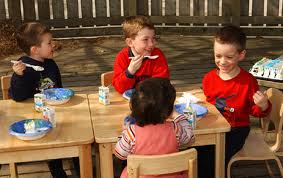
Picture this…
Sophie is 4 years old. She is asked to sit at the table for lunch… it is tuna bake today. Sophie really dislikes tuna and they never eat it at home… as Dad dislikes it too!
Sophie is best friends with Ava and they love to chat over lunch, however they are always placed at different tables because they talk too much. Sophie sits and begins to pick at the pasta bake, eating only the pasta. The educator tells her “Sophie, eat all your lunch please otherwise no dessert”
Sophie tries to eat the tuna and starts to gag… she really does not like it! The educator seems upset with her and says “oh stop that.. Now eat up your lunch, its not that bad!” Sophie eats the pasta only and leaves the tuna. She feels satisfied and is looking forward to yoghurt however she doesn’t receive any. When she asks for some the educator says “you didn’t eat your lunch Sophie so no dessert”
Does this happen in your service? Or have you seen a similar scenario before?
What messages are we sending children about eating, food, having preferences? Why do children have to like everything, when we don’t? Why do children have to eat everything on their plate or rush through their meal when we should in actual fact eat slower so we don’t consume everything on our plate? http://children.webmd.com/guide/kids-healthy-eating-habits
Why can’t meal times be social occasions where children can chat, laugh and enjoy each other’s company?
The National Quality Standards QA2.2 state that healthy eating is promoted and QA 5.1 and 5.2 state that children are supported through respectful and equitable relationships with educators. The above scenario does not reflect these standards, instead it demonstrates a coercive, disrespectful interaction which confuses and intimidates the child.
Children’s days are busy and meal times provide them with the opportunity to sit and interact in a relaxed way with their friends.. It is a time to listen, discuss food and nutrition, it is a time for staff to observe friendships and for children to enjoy the social context of food rather than possible negative emotions linked with eating.
By creating a more supportive environment you will promote a sense of belonging and community within your service and observe children developing their autonomy and interdependence (EYLF O1), a sense of well-being (EYLF O3) along with communication skills (EYLF O5).
Isn’t that why we have options for food …….not everybody likes the same food. I don’t believe in punishing for not eating something you don’t like, the fact that Sophie attempted to eat it showed that she was hungry but didn’t like the tuna. She should of been allowed to have yoghurt.